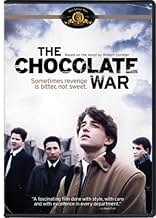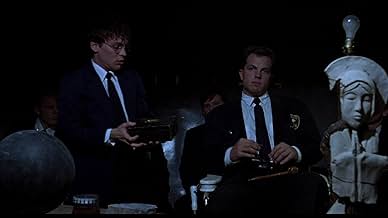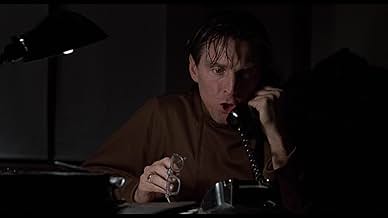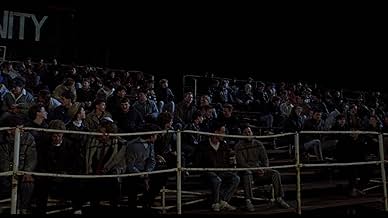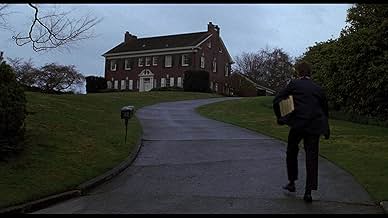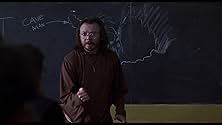Füge eine Handlung in deiner Sprache hinzuThe Vigils are a gang of students at Trinity Catholic School... part of the tradition. They control the other boys by intimidation and the threat of violence.The Vigils are a gang of students at Trinity Catholic School... part of the tradition. They control the other boys by intimidation and the threat of violence.The Vigils are a gang of students at Trinity Catholic School... part of the tradition. They control the other boys by intimidation and the threat of violence.
- Regie
- Drehbuch
- Hauptbesetzung
- Auszeichnungen
- 2 Nominierungen insgesamt
- Archie
- (as Wally Ward)
- Emile Janza
- (as Brent Fraser)
Empfohlene Bewertungen
"The Chocolate War" is the directorial debut of actor Keith Gordon ("Christine," "Back to School"), who also wrote the screenplay. The film is a fairly faithful adaptation of Cormier's novel, but the ending is changed significantly. Fans of the book argue that Gordon's ending for the film is too "tidy" or "happy," but in it's own way the film ends on a rather despairing note, with no easy answers or solutions.
Obviously filmed on a shoestring budget, "The Chocolate War" still boasts wonderful performances by its young cast. Mitchell-Smith is quite good as Jerry Renault, as well as the previously mentioned John Glover. Wally Ward (better known today as Wallace Langham of "Veronica's Closet") is very good as the Vigils' evil "assigner" Archie, and Bud Cort ("Harold and Maude") has a funny cameo as another teacher. Sometimes the pacing is slow, and sometimes the director attempts to be a little too "artistic" in his style; the film also suffers from a soundtrack that was dated even when the movie was made (the music comes from such new-wave dinosaurs as Yaz and Kate Bush). But "The Chocolate War" is a very thoughtful, well acted, compelling piece of work, and that is a cinematic rarity. Barely seen at the time of release and sometimes hard to find in video stores, "The Chocolate War" is well worth watching...and also well worth reading.
John Glover's performance as the twisted and politically carnivorous Brother Leon is stunning and easily his best work. With echoes of Lord of the Flies, The Chocolate War explores the outer reaches of cruelty, fear and control exercised by the two antagonistic forces of the student led secret society The Vigils, and the school's acting school head - Brother Leon. Anyone who has ever been bullied or coerced to side with bullies out of the necessity for self-preservation will find a string of painful moments to relate to in this film.
The soundtrack is a masterpiece of emotion. The intro to Peter Gabriel's "We Do What We're Told" is used as a recurring musical theme providing an atmospheric backdrop to the web of cruelty and manipulation that unfolds for Jerry the protagonist. But the revelation is the haunting piano of "Shepherd's Song" by Scott Cossu, which holds the space for Jerry's introspection, his loss and the tragedy of his situation.
Yes, there are some elements lacking in this film - namely the performance of the hero (Jerry) played by Ilan Mitchell-Smith and some of the dated directorial techniques adopted by Keith Gordon for the flashback sequences and other scenes. However the strength of the story, soundtrack and performances from John Glover and Wallace Langham tower above the film's shortcomings. Keep in mind this was Gordon's feature film directorial debut.
I'm not going to comment on the ending, other than to say it works perfectly for the narrative of this film and is in no way disappointing. To the contrary, it still moves me to tears despite more than half a dozen viewings of this film over the years.
The Chocolate War is difficult to find but absolutely essential viewing.
Our young protagonist, Renault, still agonizing over the death of his mother, is given a right-of-passage style task by his school's secret society, run by the calculating and elagantly power-hungry Archie : To refuse to sell chocolates to boost school income for 10 days (an activity Brother Leon, the equally power-hungry John Glover, is pushing on the students with unexpected zeal). But when his ten days are up, he still refuses to bend to the will of a system that wants only to use him as a tool. Both Archie and Brother Leon then use every method in their power to keep this rebel without a cause from toppeling them from power.
Simple enough, but this, as I said, is not a simple film about fighting the powers that be. The protagonist actually has little to say about his own action: he's so opaque that it seems even HE doesnt know exactly what he's rebelling against, just that he can't give up. He doesnt really know what he's doing, and as his life is made more and more awful by Archie and Brother Leon, it becomes increasingly clear he doesn't enjoy it either. He simply feels compelled to, and stoically refuses to give in, despite the obvious pointlessness of his rebellion and the cruel consequences that ensue. But this makes for a very hard hero to identify with and root for.
In fact, most of the film revolves around Archie and his attempt to break Renault's will. Archie is very talkative, and in fact the camera seems oddly attracted to his mercilessness, elegance and charisma, even as we assume we're supposed to revile him. Even creepy John Glover plays his villain very straight, giving only a vague, intangible sense of menace. By creating a hero we can't understand and villians we gravitate towards, the film subtly creates a situation where we can't really take sides, and can only observe the pathetic hopelessness of both situations. After all, this is all about selling CHOCOLATES. This throws the entire proceedings into an almost absurdist light. Light touches of humor (including a brief but spot-on perfect cameo by "Harold and Maude"'s Bud Cort) reinforce this classification and keep the proceedings from ever becoming bogged down in their gloominess.
All in all, though, The Chocolate War is a very dark, slightly surreal tale of the emptiness of life, for winners or losers. It suggests that, fight the system or succeed with it, you're still just a tool of larger forces, unflinchingly puppeteering smaller lives for their own banal ends. It offers no solutions and no salvations, not for anyone. Just hubris and humiliation, and perhaps a grim chuckle or two along the way. Its this demenor that makes it a truly overlooked and rather unique cinema gem, well - worth some time and thought.
Wusstest du schon
- WissenswertesThe film's music budget was about $15,000. Most of the artists featured on the soundtrack allowed the filmmakers to use their songs at bargain basement prices. David Bowie wanted $100,000 to use his song "Heroes" during the final scene and credits, so Kate Bush's "Running Up That Hill" was substituted. In exchange for the use of two of his songs, and in light of the difficult subject matter of the film, musician and activist Peter Gabriel requested that his affiliation and support of the human rights organization Amnesty International be included in the film's post-credits.
- Zitate
[Archie is on the phone with Janza who has just told Archie about him and a gang beating up Jerry]
Archie Costello: [into the phone] WHAT? Janza, can't you do anything right?
Emile Janza: [into the phone] Hey, you said that the guy should take a hint about what he's up against. So, I thought I give him a brutal ass-kicking to show him that it's not nice to mess around with the Vigils. I asked some kids to assist me with the brawl.
Archie Costello: [into the phone] Who were they? I don't want outsiders involved in this!
Emile Janza: [into the phone] Just some animals that live in my neighborhood. They'd beat up their own grandmothers for a dollar.
- VerbindungenFeatured in Camp Midnite: Show 104 (1989)
- SoundtracksIn My Room
Performed by Yazoo (as Yaz)
Written by Vince Clarke
Used with permission of Stainless Music (BMI) on behalf of Sonet Records and Publishing Ltd.
Courtesy of Sire Records / Mute Records
By Arrangement with Warner Special Products
Top-Auswahl
- How long is The Chocolate War?Powered by Alexa
Details
Box Office
- Budget
- 500.000 $ (geschätzt)
- Bruttoertrag in den USA und Kanada
- 303.624 $
- Eröffnungswochenende in den USA und in Kanada
- 14.351 $
- 20. Nov. 1988
- Weltweiter Bruttoertrag
- 303.624 $
Zu dieser Seite beitragen


